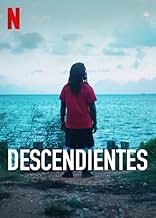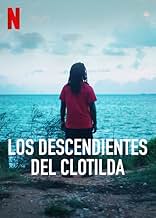IMDb-BEWERTUNG
7,1/10
1525
IHRE BEWERTUNG
Nachkommen versklavter Afrikaner*innen, die 1860 illegal auf einem Schiff in Alabama eintrafen, hoffen nach dem Fund des Wracks auf Gerechtigkeit und inneren Frieden.Nachkommen versklavter Afrikaner*innen, die 1860 illegal auf einem Schiff in Alabama eintrafen, hoffen nach dem Fund des Wracks auf Gerechtigkeit und inneren Frieden.Nachkommen versklavter Afrikaner*innen, die 1860 illegal auf einem Schiff in Alabama eintrafen, hoffen nach dem Fund des Wracks auf Gerechtigkeit und inneren Frieden.
- Regie
- Drehbuch
- Hauptbesetzung
- Auszeichnungen
- 7 Gewinne & 24 Nominierungen insgesamt
Empfohlene Bewertungen
Hollywood fan of history and true events movies. This is for you dear. It elaborates the most tragic event in the history of United States of America, despite of being war with the Latin Americans (Red Indians) there is also a painful history of black Africans who were brought from Africa forcefully into the strange lands of America and become the slaves of white people. Most of them were also killed and separated from their families and even the children of africans faced these traumatic events at that time. After that a long struggle was started which gives them a little bit freedom but there are still lives who are waiting for justice.
This is truly, deeply, sincerely an important piece of US History and an amazing story. The Clotilda and Africatown are remarkable and should be revered. The Clotilda is an extremely rare find that should be a National Monument. But of course - this represents a lot more than just the story of a ship!
I live in Mobile. I know these places! There have been a couple of documentaries now, about the Clotilda - and I have been excited to see them both; however, unfortunately - I don't think anyone has quite hit the mark yet when it comes to telling and presenting this story with the impact it deserves, but this wasn't bad - I enjoyed it - the story and the people are incredible - but I'm still waiting for a Clotilda show that tells it all with the passion and excitement to do this justice.
I live in Mobile. I know these places! There have been a couple of documentaries now, about the Clotilda - and I have been excited to see them both; however, unfortunately - I don't think anyone has quite hit the mark yet when it comes to telling and presenting this story with the impact it deserves, but this wasn't bad - I enjoyed it - the story and the people are incredible - but I'm still waiting for a Clotilda show that tells it all with the passion and excitement to do this justice.
The polluting factories and the highway that destroyed the Downtown area of Africatown are just other facts that help validate what the descendants are saying. Historians use oral histories as part of their research - this is a common practice. A lot of people don't want you to see this documentary. They are afraid of how it will make them look. They are afraid that it will explain someone's situation. This is one of the reasons I watched the documentary. It explains so much about the Bible Belt south. If you care about American history at all, you will find this documentary rewarding. Watch it and decide for yourself.
I've never heard of this - I've got no real expectations, but it doesn't exactly sound like a giggle.
It tells the story of the Clotilda/Clotilde (the spelling seems uncertain), a slave ship organised for a bet by a white landowner after slavery had been abolished. This brought 110 Africans to Alabama - and was then burned and sunk leaving no evidence it ever existed, except for a load of people who'd been threatened with lynching if they ever spoke about it. But they told their children, and their children's children, and - well, you get the idea! And now their 6x great-grandchildren are telling us their stories.
Unfortunately, because the ship was burned and sank, there's absolutely no physical evidence that any of this happened - so part of the film focusses on efforts to find the wreck, but when you look at a map of the Mobile river you can't help but feel their chances are somewhat limited (no spoilers as to whether they found it though!). And they also interview quite a few people that have no interest in finding it - as one lady puts it "how do I put this? I just don't care". But might she change her mind?
The film also considers other elements of the history of the community - it makes an interesting point that a lot of the surrounding land is used for heavy industry which has resulted in various health issues - and the land is owned by the descendants of the landowner that originally brought the slaves over, so history (once again) shows its nasty habit of repeating itself. And then talk turns to reparations...
What are reparations supposed to provide? Justice? Punishment? Closure? Whilst crimes can't be inherited by descendant, assets and hardship certainly can, so what value should be placed on them? If reparations are made, who do they go to? And given that the landowner's descendants have absolutely no interest in engaging in any dialogue, how could they even be possible?
The film certainly poses some interesting questions although it probably won't surprise you hear that it doesn't answer them - that's probably asking a bit too much from a 109 minute Netflix documentary. The film does manage to end on a positive note though - various people have hope for the future, whatever it might hold.
However, I also have to report that the interesting questions don't fill up a huge amount of those 109 minutes either - it's all very worthy, but unfortunately it's not exactly thrilling. It's most a lot of people just talking about stuff that means something to them but not a lot to anyone else or reading from a book. There's also a lot of repeated use of the same historical footage - it feels unfortunately like filler.
I feel a bit mean being nasty about what it obviously an important film for a lot of people - I know it never hurts for me to be educated in this stuff, but I'm afraid that just didn't really do it for me. It's diverting in places with some nice countryside (balanced by some very ugly urban scenes), but it's no more than that, I'm afraid. If, after that glowing recommendation, you still fancy watching it then it's on Netflix but there's much more interesting stuff on there.
It tells the story of the Clotilda/Clotilde (the spelling seems uncertain), a slave ship organised for a bet by a white landowner after slavery had been abolished. This brought 110 Africans to Alabama - and was then burned and sunk leaving no evidence it ever existed, except for a load of people who'd been threatened with lynching if they ever spoke about it. But they told their children, and their children's children, and - well, you get the idea! And now their 6x great-grandchildren are telling us their stories.
Unfortunately, because the ship was burned and sank, there's absolutely no physical evidence that any of this happened - so part of the film focusses on efforts to find the wreck, but when you look at a map of the Mobile river you can't help but feel their chances are somewhat limited (no spoilers as to whether they found it though!). And they also interview quite a few people that have no interest in finding it - as one lady puts it "how do I put this? I just don't care". But might she change her mind?
The film also considers other elements of the history of the community - it makes an interesting point that a lot of the surrounding land is used for heavy industry which has resulted in various health issues - and the land is owned by the descendants of the landowner that originally brought the slaves over, so history (once again) shows its nasty habit of repeating itself. And then talk turns to reparations...
What are reparations supposed to provide? Justice? Punishment? Closure? Whilst crimes can't be inherited by descendant, assets and hardship certainly can, so what value should be placed on them? If reparations are made, who do they go to? And given that the landowner's descendants have absolutely no interest in engaging in any dialogue, how could they even be possible?
The film certainly poses some interesting questions although it probably won't surprise you hear that it doesn't answer them - that's probably asking a bit too much from a 109 minute Netflix documentary. The film does manage to end on a positive note though - various people have hope for the future, whatever it might hold.
However, I also have to report that the interesting questions don't fill up a huge amount of those 109 minutes either - it's all very worthy, but unfortunately it's not exactly thrilling. It's most a lot of people just talking about stuff that means something to them but not a lot to anyone else or reading from a book. There's also a lot of repeated use of the same historical footage - it feels unfortunately like filler.
I feel a bit mean being nasty about what it obviously an important film for a lot of people - I know it never hurts for me to be educated in this stuff, but I'm afraid that just didn't really do it for me. It's diverting in places with some nice countryside (balanced by some very ugly urban scenes), but it's no more than that, I'm afraid. If, after that glowing recommendation, you still fancy watching it then it's on Netflix but there's much more interesting stuff on there.
Slavery was one of the most important, and most disgraceful, parts of US history. Most of the focus on it emphasizes the plantations, the whipping of the enslaved African-Americans, and the Underground Railroad. A lesser known part is the slave trade itself. Outlawed in 1808, it continued in secret. The last ship to bring kidnapped Africans to the United States was the Clotilda, which docked in Mobile, Alabama, before getting sunk to hide its violation of the ban on slave-trading.
Margaret Brown's "Descendant" focuses on this, as well as the descendants of the enslaved people on the Alabama coast. It's a fascinating look at the aftermath of slavery, and how the descendants of the slaveowners are the biggest landholders in the area. Not to mention the chemical refineries dumping all sorts of toxins.
This is not a documentary that you'll forget anytime soon. I recommend it.
Margaret Brown's "Descendant" focuses on this, as well as the descendants of the enslaved people on the Alabama coast. It's a fascinating look at the aftermath of slavery, and how the descendants of the slaveowners are the biggest landholders in the area. Not to mention the chemical refineries dumping all sorts of toxins.
This is not a documentary that you'll forget anytime soon. I recommend it.
Top-Auswahl
Melde dich zum Bewerten an und greife auf die Watchlist für personalisierte Empfehlungen zu.
- How long is Descendant?Powered by Alexa
Details
- Erscheinungsdatum
- Herkunftsland
- Offizieller Standort
- Sprache
- Auch bekannt als
- Descendant
- Drehorte
- Produktionsfirmen
- Weitere beteiligte Unternehmen bei IMDbPro anzeigen
- Laufzeit1 Stunde 49 Minuten
- Farbe
- Sound-Mix
Zu dieser Seite beitragen
Bearbeitung vorschlagen oder fehlenden Inhalt hinzufügen























